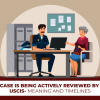
If you want to know the reasons to hire a personal injury lawyer, you have come to the right place!
A personal injury can have disastrous aftereffects that affect not just one’s physical health but also one’s emotional and financial security.
The Centers for Disease Control and Prevention (CDC) reports that unintentional injuries cost billions of dollars in medical bills and lost productivity each year, making them a major cause of mortality and disability in the US.
Unintentional injuries caused an estimated 38.8 million ED visits in 2021 alone. When someone else’s negligence causes these injuries, the complications of pursuing compensation can be overwhelming.
It can be difficult to manage insurance claims, court cases, and medical records while recuperating from injuries. This is where a personal injury lawyer’s knowledge is quite helpful.
A skilled attorney can protect your rights, navigate the legal complexities, and fight for the full compensation you deserve for medical expenses, lost wages, pain, and suffering, allowing you to focus on your recovery.
Types of Personal Injury

A wide range of circumstances when someone is harmed as a result of the carelessness or wrongdoing of another party are covered under personal injury law.
Knowing the various case types can assist people in determining if their circumstances call for legal action. The following are a few of the most popular categories:
1. Motor Vehicle Accidents:
Firstly, among the most common personal injury cases are those involving cars, trucks, motorcycles, and pedestrians.
The seriousness of these incidents is demonstrated by the 42,795 traffic fatalities that the National Highway Traffic Safety Administration (NHTSA) documented in 2022.
Additionally, in order to establish fault, calculate damages, and bargain with insurance companies, these situations frequently include intricate investigations. Distracted driving, speeding, drunk driving, and breaking traffic laws are common reasons.
2. Slip and Fall Accidents:
Secondly, these situations, which frequently take place on someone else’s property, are covered under premises liability.
It is the legal responsibility of property owners to keep guests safe. Serious injuries can result from hazards like wet floors, uneven walks, poor illumination, and damaged staircases.
Furthermore, falls are a serious public health issue since they result in more than 8 million hospital ER visits each year, according to the National Floor Safety Institute (NFSI).
3. Medical Malpractice:
Thirdly, a healthcare professional’s negligence results in patient harm and constitutes medical malpractice. This can include surgical errors, misdiagnoses, birth injuries, medication errors, and anesthesia mistakes.
These cases are often complex, requiring expert medical testimony to establish the standard of care and prove negligence.
Furthermore, a study published in the Journal of the American Medical Association (JAMA) estimates that medical errors contribute to hundreds of thousands of deaths each year in the United States.
4. Product Liability:
Manufacturers, distributors, and retailers can be held liable for injuries caused by defective products. These defects can arise from design flaws, manufacturing errors, or inadequate warnings.
Examples include faulty car parts, dangerous toys, defective medical devices, and contaminated food. The Consumer Product Safety Commission (CPSC) plays a crucial role in regulating product safety and recalling dangerous products.
5. Workplace Accidents:
While workers’ compensation provides some benefits for on-the-job injuries, a personal injury claim may be possible if a third party (other than the employer) is responsible for the accident.
For instance, if a worker is injured by defective equipment manufactured by a third party, they could potentially pursue a product liability claim.
The Bureau of Labor Statistics (BLS) tracks workplace injuries and fatalities, providing valuable data on workplace safety.
6. Dog Bites:
Dog owners are generally held responsible for injuries caused by their dogs. Additionally, these cases can involve strict liability laws, meaning the owner is liable regardless of prior knowledge of the dog’s aggressive tendencies.
Moreover, it can also include negligence laws, where the owner knew or should have known about the dog’s potential to bite.
The Centers for Disease Control and Prevention (CDC) estimates that approximately 4.5 million cases of dog bites occur every year in the United States.
7. Nursing Home Abuse and Neglect:
Sadly, elderly residents in nursing homes can be victims of abuse or neglect, leading to physical injuries, emotional trauma, and even death.
These cases can involve physical abuse, emotional abuse, neglect of basic needs, and financial exploitation.
Reasons to Hire a Personal Injury Lawyer

A personal injury lawyer plays a multifaceted role when representing clients who have suffered harm due to someone else’s negligence.
They offer legal counsel through an often confusing system of laws and precedents that vary widely by jurisdiction. They must understand these intricacies and apply them to your unique circumstances.
Additionally, personal injury attorneys serve as your advocate, standing up against powerful adversaries, whether they’re corporate entities, insurance firms, or individuals.
They articulate your side of the story compellingly, backing it up with legal knowledge and negotiating skills to tilt the scales in your favor.
Lastly, finding the best Chicago personal injury lawyer means having a supporter and ally in your journey toward seeking justice.
They empathize with your plight and vigorously protect your interests, striving to alleviate some of the burdens you carry.
Maximizing Your Compensation Claim
Firstly, it’s easy to think of compensation in terms of immediate medical bills and lost wages. However, a skilled personal injury lawyer considers your injuries’ full economic and non-economic impact.
This is where the significant difference in settlements between represented and unrepresented claimants comes from.
The Insurance Research Council’s finding that represented claimants receive 3.5 times more on average isn’t just a random statistic; it reflects the attorney’s ability to:
- Project Future Medical Expenses: If your wounds need ongoing treatment, rehabilitation, or long-term care, an attorney will work with medical experts to project these costs into the future. This is crucial for securing a settlement that covers your long-term needs, not just immediate expenses.
- Calculate Lost Earning Capacity: If your injuries prevent you from returning to your previous job or limit your future earning potential, an attorney will calculate the present value of these lost earnings. This often involves expert testimony from vocational rehabilitation specialists and economists.
- Quantify Pain and Suffering: This is a non-economic damage that compensates you for the pain, mental anguish, emotional distress, and loss of enjoyment of life caused by your injuries. Attorneys use various methods to calculate this, including the multiplier method (multiplying economic damages by a factor based on the severity of the injury) and the per diem method (assigning a daily value to your pain and suffering).
- Account for Other Damages: This can include property damage, loss of consortium (loss of companionship and intimacy with a spouse), and other related expenses.
Negotiating With Insurance Companies
Secondly, insurance companies are profit-driven businesses. Their goal is to minimize payouts. Additionally, they use various tactics to achieve this, which an experienced personal injury lawyer is well-equipped to handle:
- Lowball Offers: Insurers often offer quick settlements significantly lower than the claim’s actual value, hoping injured individuals will accept them out of desperation.
- Delaying Tactics: Delaying the claims process can put financial pressure on claimants, making them more likely to accept a lower settlement.
- Disputing Liability: Insurers may try to deny liability altogether or shift blame to the injured party.
- Requesting Recorded Statements: These statements can be used against you later if you say something that contradicts your claim.
- Requesting Broad Medical Record Releases: This allows them to search for pre-existing conditions or other information they can use to minimize your claim.
- Misinterpreting Policy Language: Insurance policies are often complex and filled with legal jargon. Insurers may use this advantage by misinterpreting policy language to deny or limit coverage.
Dealing with insurance companies can be one of the most daunting aspects of a personal injury case. Personal injury lawyers, aware of these tactics, are essential in leveling the playing field.
There is a low percentage of cases that proceed to trial, as reported by the Bureau of Justice Statistics. This highlights the need for a lawyer’s practical negotiation abilities.
They can spot any unclear terms that can impact a claim and are adept at deciphering policy language. Their knowledge is essential for challenging any coverage denials or irrational interpretations of the parameters of an insurance policy.
Additionally, they are also aware of how critical it is to describe the full extent to which an accident has affected a client’s life. They hope to obtain thorough coverage for both short-term and long-term demands by persuasively communicating these consequences.
Court Representation and Beyond
A lawyer’s role becomes even more critical once a personal injury case progresses to court. They present well-formulated arguments, meticulously prepared through in-depth legal research and understanding of case law, tailored to sway the jury or judge in their client’s favor.
An adept attorney shines in presenting cases and cross-examining witnesses, objecting to improper evidence, and keeping the courtroom proceedings focused on pertinent issues. Additionally, their quick thinking and courtroom experience are key factors in ensuring justice prevails.
A personal injury lawyer is prepared to appeal and continue the fight if a case results in a less-than-satisfactory outcome. Furthermore, they are well-versed in appellate court procedures and can identify grounds for seeking a higher court’s review.
Contingency Fee Basis
Almost anyone can afford legal representation thanks to the contingency fee arrangement, which means:
- No Upfront Costs: Hiring a lawyer doesn’t require you to pay any fees upfront
- Lawyer Gets Paid Only If You Win: the lawyer’s fees are a percentage of the settlement or verdict they secure on your behalf.
- Aligned Interests: by aligning the lawyer’s interests with yours, this fee structure encourages them to put in extra effort to get the best result.
Reduce Stress and Focus on Recovery
Finally, the physical and emotional toll of a personal injury can be overwhelming. Trying to manage a legal claim on top of this can significantly exacerbate stress levels, which can negatively impact your recovery.
Studies in health psychology have shown that stress can hinder the healing process, weaken the immune system, and increase the risk of complications. By hiring a lawyer, you can:
- Offload the Burden of Communication: Your lawyer will handle all communication with insurance companies, opposing counsel, and other parties involved in your case.
- Avoid Legal Jargon and Complex Paperwork: You won’t have to worry about deciphering legal documents or navigating complex procedures.
- Focus on Your Medical Treatment and Rehabilitation: You can prioritize your physical and emotional recovery without the added stress of managing a legal claim.
How to Choose the Right Personal Injury Lawyer?
Altogether, the journey from injury to compensation involves various steps, each with its legal intricacies.
A dedicated personal injury lawyer brings clarity to chaos and champions your cause. They use their expertise to ensure you receive the justice and compensation you rightly deserve.
However, there is one thing that you need to know! And that is what are the things that you need to consider while hiring a personal injury lawyer.
You see, choosing the right personal injury lawyer is a critical decision that can significantly impact the outcome of your case.
Here’s a guide to help you make an informed choice:
1. Experience and Specialization:
Firstly, personal injury law is a broad field. Look for a lawyer with specific experience in handling cases similar to yours.
For instance, if you were injured in a car accident, seek a lawyer with a proven track record in motor vehicle accident cases.
The American Bar Association (ABA) offers resources and directories that can help you find lawyers specializing in specific areas of law.
2. Track Record and Reputation:
Secondly, research the lawyer’s success rate and reputation within the legal community. Look for information on their case results, settlements, and verdicts.
Online reviews and testimonials from previous clients can provide valuable insights. Additionally, legal rating services like Martindale-Hubbell offer peer reviews and attorneys’ ratings, which can help assess their professional abilities and ethical standards.
3. Local Knowledge:
Familiarity with local courts, judges, and opposing counsel can be a significant advantage. A lawyer with a strong regional presence understands the nuances of the local legal system and can navigate it more effectively. Furthermore, local bar associations can provide referrals to qualified attorneys in your area.
4. Communication and Accessibility:
Choose a lawyer who communicates clearly, responds promptly to your inquiries, and keeps you informed about the progress of your case. Effective communication is crucial for a successful attorney-client relationship.
A survey by Clio, a legal technology company, found that 85% of clients expect regular updates from their lawyers. This highlights the importance of communication in client satisfaction.
5. Free Consultation:
Most personal injury lawyers offer free initial consultations. This is an opportunity to discuss your case, ask questions, and assess whether the lawyer fits you. Use this time to inquire about their experience, fees, and approach to handling cases.
6. Contingency Fee Basis:
Ensure the lawyer works on a contingency fee basis. This means that they will only get paid if you are able to win the case. This aligns their interests with yours and eliminates the financial barrier to accessing legal representation.
7. Trust Your Gut:
Ultimately, you should choose a lawyer you feel comfortable with and trust to represent your best interests. Trust your instincts and choose someone you feel confident in.
Read Also:
- Understanding When You Can Claim for Personal Injury Compensation in the UK
- Legal Considerations for Dementia Patients in Personal Injury Cases
- How Emotional Distress Plays a Role in Personal Injury Cases?











0 Reply
No comments yet.